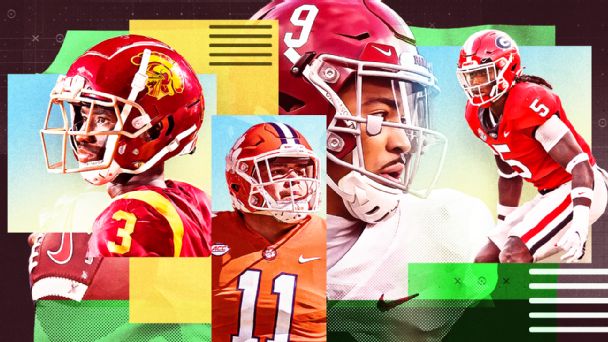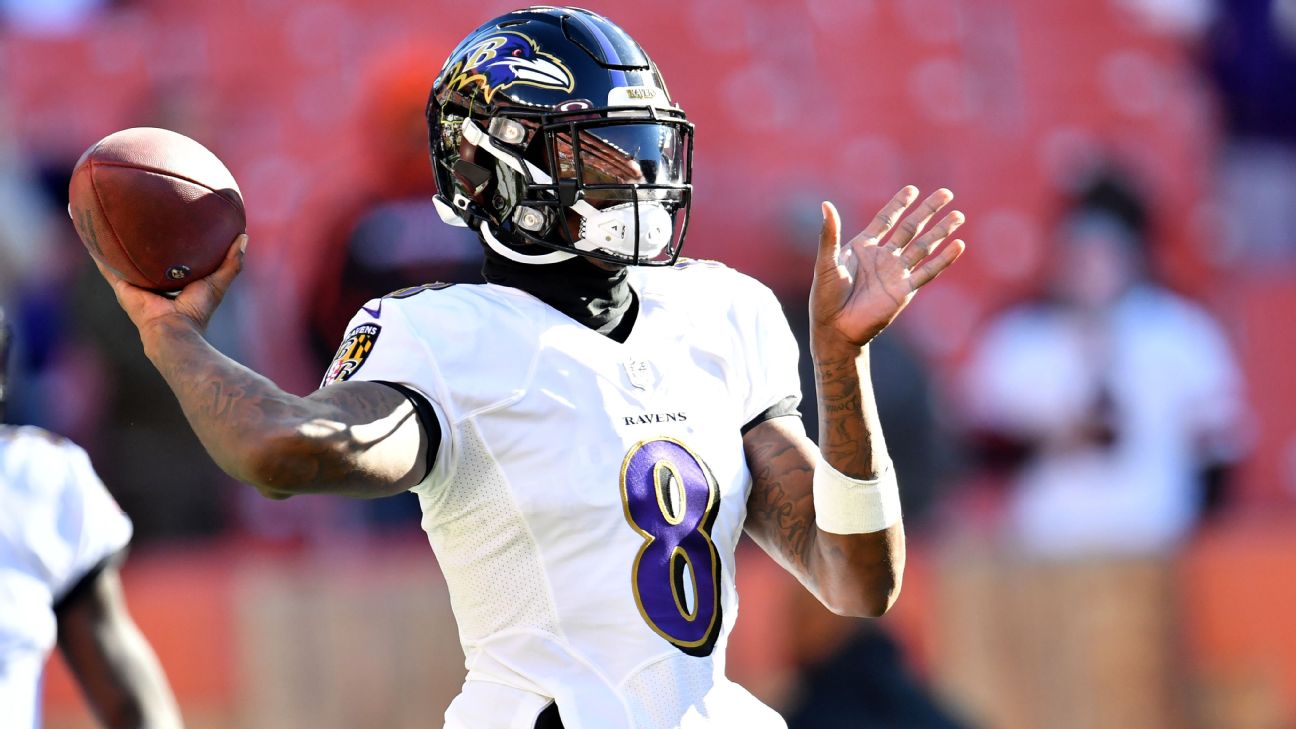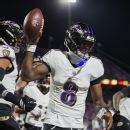Should the Colts trade for Lamar Jackson? What we know about the fit, price and potential concerns
INDIANAPOLIS — Within hours of the Baltimore Ravens placing the nonexclusive franchise tag on quarterback Lamar Jackson on March 7, reports surfaced that numerous teams had no interest in negotiating with Jackson.
The Indianapolis Colts, who haven’t had a quarterback start consecutive season openers since Andrew Luck in 2015-16, were not among those teams.
Unlike with the exclusive franchise tag, the nonexclusive tag allows Jackson to negotiate a contract with other teams, and the Ravens would have five days to either match the deal or receive two first-round draft picks as compensation.
If the 26-year-old former MVP leaves Baltimore, there are reasons to believe the Colts would be a good fit. Owner Jim Irsay is intent on solving a quarterback problem that’s defined Indianapolis for the past five years, and he’s proved willing to pay top dollar. But Jackson, who has missed 11 games over the past two seasons because of injuries, is reportedly looking for a fully guaranteed deal. And Jackson is representing himself instead of hiring an agent, which would seemingly complicate negotiations.
What to know for the 2023 NFL draft

Indianapolis did not rule out having discussions with Jackson, according to a team source. However, the club has not taken any substantive steps regarding Jackson and it is unclear whether it intends to do so. Team sources have expressed skepticism about pursuing Jackson.
But there are compelling reasons for the Colts to investigate Jackson’s availability. After all, it costs them nothing to simply have a conversation. And can a team that has had the Colts’ problems at quarterback afford to rule out any avenue to landing a proven starter — even when the process is complicated?
“When you’re changing quarterbacks every year, it’s tough,” Colts general manager Chris Ballard admitted after last season. “It’s tough on everybody.”
The Colts’ dizzying quarterback carousel is about to make yet another revolution after 2022 starter Matt Ryan was released last week. Since a quarterback change is already in the offing, here’s why the Colts should — or should not — entertain the idea of acquiring Jackson.
Why it makes sense
A rare opportunity
Ask yourself: Do you see the Kansas City Chiefs allowing Patrick Mahomes to hit the market? Can you envision the Buffalo Bills making Josh Allen available for a trade? Would the Cincinnati Bengals consider letting Joe Burrow walk?
That trio represents the tip of the iceberg when it comes to the depth of quarterback talent currently residing in the AFC. And you’ve still got to account for players like the Los Angeles Chargers’ Justin Herbert, Miami Dolphins’ Tua Tagovailoa and potential rebound seasons from the Denver Broncos’ Russell Wilson and Cleveland Browns’ Deshaun Watson.
The Colts have the fourth overall pick in the draft, but there are at least two quarterback-needy teams ahead of them in the Carolina Panthers at No. 1 and the Houston Texans at No. 2. Indianapolis is expected to have, at best, the third choice of quarterbacks. Landing Jackson would be the quickest route to closing the quarterback gap the Colts currently face in their conference. It would be a more certain route than relying on a quarterback pick who might or might not pan out.
The Colts aren’t relevant
The Colts’ last deep playoff run ended with their AFC Championship Game appearance in 2014. Since then, they are 61-68-1 (.473 winning percentage). They’ve made two playoff appearances in that span, going 1-2.
The Colts’ yearslong period of irrelevance continues to linger. With the team coming off a 4-12-1 season in 2022 and no substantive upgrades so far this offseason, dramatic improvement might be difficult. It all begs the question: What does the immediate future hold for Indianapolis?
With many of the Colts’ core players in the primes of their careers — such as running back Jonathan Taylor and defensive tackle DeForest Buckner — the typical timeline required for a rookie quarterback to develop is not optimum. Adding a player like Jackson could mean an immediate return to relevance and competitiveness in a deep conference.
Scheme fit
One of the most persuasive arguments for the Colts to pursue Jackson is his potential fit with first-year head coach Shane Steichen. During Steichen’s two seasons as Philadelphia Eagles offensive coordinator, he helped maximize the talents of another dual-threat quarterback, Jalen Hurts.
Best of NFL Nation

Steichen’s track record of adapting his scheme and playcalling to his quarterbacks while with the Chargers and Eagles suggests he could develop a creative attack with Jackson as a centerpiece. Jackson had back-to-back 1,000-yard rushing seasons in 2019 and 2020 and is the first NFL player to produce 5,000 yards passing and 2,500 yards rushing in the first three seasons of a career. Meanwhile, Hurts led all quarterbacks in rushing attempts (165) and was fourth in QBR (66.4) under Steichen last season.
Combining Jackson’s running ability with the presence of a star running back such as Taylor could provide the Colts with significant vertical passing opportunities given the rushing threat posed to defenses.
Acquiring Jackson would give Steichen a legitimate head start in Year 1 and play to his strength: capitalizing on his quarterback’s abilities.
They’ve done it before
Here’s a fun fact: The Colts have on two occasions in the past two decades employed the highest-paid player in the NFL.
Both Peyton Manning and Luck signed extensions during their stints with the Colts that, at the time, were the richest contracts in league history. Both deals also contained record-breaking amounts of guaranteed money. The two events represent significant precedent of Irsay going over and above the economic limitations of being in a small market.
Granted, the Colts were heavily invested in Manning and Luck, having drafted each with the first overall pick in their respective draft years. And Jackson’s reported request for a fully guaranteed contract is an important distinction. But there are ways to navigate these deep financial waters, even for a team that faces difficulty generating massive profits apart from the NFL’s revenue-sharing system.
The Colts’ ability to pursue Jackson became more realistic when they cleared roughly $17 million in salary cap space by releasing Ryan and trading cornerback Stephon Gilmore last week. They have about $20 million in space remaining after recent signings and possess the ability to create more through roster moves, if necessary.
1:23
Ninkovich would love to see the Patriots pursue Lamar Jackson
Rob Ninkovich makes a case for Lamar Jackson to join Bill Belichick and the Patriots.
Why it might not work
Worth the effort?
There is a risk in entering negotiations with Jackson. The Ravens have the right to match any offer and could be inclined to do so unless it contains terms the franchise is fundamentally opposed to, such as a fully guaranteed deal.
What team wants to enter a situation knowing it might come away feeling as though it was used to do the negotiating for the players’ current team? What’s more, the fact that the Ravens have been unable to come to terms with Jackson after more than two years of negotiations will give teams pause.
There’s another bit of complexity here: A team signing Jackson to an offer sheet might need to make some salary cap moves in advance in case the Ravens decline to match. Depending on how the deal is structured, that might impact other areas of the roster for Indianapolis even though there’s no certainty the Colts would land Jackson.
Financial implications
The good news is there are ways around the salary cap complications on the front end of a potential Jackson contract. Consider Watson’s deal with the Cleveland Browns. Despite it containing $250 million in guaranteed money, it was written in a way that reduced the first-year salary cap figure to $9.4 million. The downside is that kind of structure significantly inflated his salary cap number in future seasons. Watson’s contract currently calls for cap figures that exceed $60 million a year in 2024 to 2026.
Perhaps more problematic than the salary cap obstacles are the guaranteed payments Jackson is sure to want. He reportedly wants a guaranteed deal in line with Watson’s.
Even if Jackson is willing to settle for something less than a fully guaranteed deal, there will assuredly be massive amounts of guaranteed money in his contract. The future guarantees must be placed in escrow, per league rules, often limiting the amount of money owners are willing to guarantee. In the case of the Browns and Watson, that means as much as $185 million had to be escrowed to account for the guarantees after Year 1 of his contract.
Does Irsay (or other owners, for that matter) have that kind of liquidity? And even if he does, would he be willing to squirrel away such a massive amount of cash? You can see why the NFL Players Association hates this rule. But until it changes, it remains a reality in these kinds of conversations.
Finally, any team that pursues Jackson is going to need to offer a premium contract to deter the Ravens from matching. It remains to be seen what such a contract would look like.
Injury concerns
Is some of the conversation around Jackson’s injury history overstated? Maybe. But for a team that might go all in to acquire the quarterback, his health must be a significant part of the conversation.
Jackson hasn’t played a full season since he was a rookie in 2018, although he hadn’t been sidelined by an injury until 2021. He missed the 2019 finale after Baltimore had clinched the top seed and he was forced to sit out a game in 2020 due to COVID-19. But, in the last two seasons, Jackson was out 11 combined games with ankle and knee injuries, including the Ravens’ wild-card loss to the Bengals in January.
When you factor in the Colts’ opportunity to proceed with a draft pick at a much lower cost — and, therefore, less risk — there’s a lot to think about.


